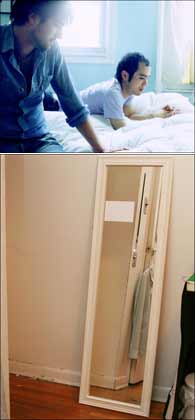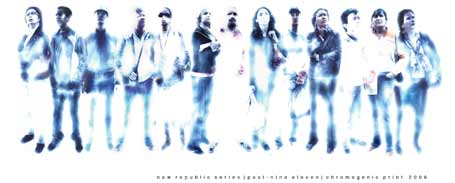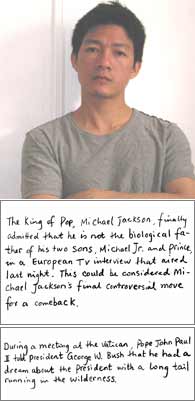I'm at the opening party for The Male Gaze, a gay art exhibition at Powerhouse Arena in Brooklyn, New York. It's an extremely gay event - camp hits are blaring on the DJ's turntable, Peter Berlin DVDs and queer zines are on sale, and beautiful men of all colours are sharing cranberry vodkas and gossip. The cavernous gallery walls are plastered with images, mostly of male models in states of undress - there's lightjet text art by Canadian porn director/video artist Bruce LaBruce, aluminum prints of Red Guards by Russian porn star/poltical dissident Slava Mogutin, and deliciously topless portraits by African-American photographer Paul Mpagi Sepuya.

Tonight, however, I'm interested in meeting two specific artists, hailing from East Asia: Futoshi Miyagi of Okinawa, Japan, and Qing Liu of Fujian province, China. The two have never met before, though they've both come to the attention of the studly young curator Nicholas Weist, who sees them as promising figures in the formation of the next generation of gay art in America.
Futoshi, a fresh college graduate at 25 years of age, is still disarmingly awkward, ill at ease with speaking in English (though he writes with complete fluency) and is dressed unobtrusively in checkered shirt and jeans. Qing, on the other hand, radiates sophisticated maturity and confidence in his matching brown blazer, vest and pants, with only his spiky gelled hair and chunky plastic spectacle frames to betray his quirkiness.
The two are clearly in very different stages of their artistic development, but nonetheless, their lives share some resonant parallels - both grew up in small island towns which they abandoned for the buzz and freedom of the USA, both only discovered their artistic bent in America, and both specialise principally in conceptual photography.
I speak to Futoshi first. He's shy and terribly soft-spoken, but I tell him how I've been fascinated by his work ever since Jason Wee, a gay Singaporean artist based in New York, blogged about his "Strangers" series.
æ: So - tell me about how and why you came to America.
Futoshi: I moved here five years ago. I went to Washington State first; I went to college there and when I graduated I went to the City College of New York.
I had a troubled relationship with my home, Kuna Island in Okinawa. I didn't really like the society there - it was a bit small; everybody knew everybody else, and it was really suffocating for me. I moved to Tokyo, and it was a big difference, but not enough; it was still Japan. The homophobia in the country was really too much for me. Homosexuality may be accepted, but in everyday life you can't talk about it. In a political sense, we have more rights here.
æ: Did you always want to be an artist?
Futoshi: Not really. I would take pictures for fun when I was 20, but not really. I think at first I wanted to study journalism in college, but that was impossible [because of language difficulties].
æ: I've been fascinated by your breakout piece, "Strangers," where you took photographs of yourself in the homes of other gay New Yorkers, pretending to be in a relationship. Why and how did you create this photographic series?
Futoshi: I guess I wanted to come out. While I was still at CCNY, a lot of people didn't realise I was gay. I wanted to have this thing to show people. Also, I'm rather bad at meeting people, and I didn't know that many gay people. So it was a very practical way to meet them.
At first I wanted to capture a range of gay New Yorkers, but then I decided to allow sitters to volunteer randomly. There are whites, blacks, Asians, a three-man marriage - which was a bit of a fiasco because one of the guys didn't know what was going on when we were taking pictures. There was also a drag queen. First we shot him being a man, and then again while he was putting on the makeup and eyebrows, and then as a woman. That one took hours - usually it took only 30 minutes or less.
æ: It's a really beautiful piece for me, yet it's sad - it suggests how temporary and illusory relationships can be, even though they're filled with such happiness. Did you ever sleep with any of the sitters, though?
Futoshi: Not officially. Not during the shoot. (smiles)
æ: You've been moving toward more conceptual work since then, though - photographs washed in bleach, or microwaved with butter. Tell me about your exhibited work, "Nude."
Futoshi: It's an inkjet print, a naked self-portrait, super-glued to a bedroom mirror. So you can no longer see the photograph, only the back. It's kind of a joke - partly about the myth of Narcissus, the boy who's in love with his own reflection. But it's also about nakedness. People use the mirror and the digital camera to see themselves naked. But now that the photo is on the mirror, I don't have to see myself naked anymore.
æ: What's next for you?
Futoshi: Right now I'm actually doing a piece where I reconstruct images of the island where I grew up through a kind of collage. It's kind of romantic.
æ: Do you have plans to go back to Japan? Or are you trying to get a green card?
Futoshi: That was my goal, but it didn't work. I've been here on a student visa, but I don't really want to switch to a working visa because the type of work you can do is so restricted. Right now I'm working at a place called Bread and Butter; it's this bookstore and book distributor in Chelsea.
I don't think New York is a perfect place. It feels good, but it's such a mess, it's so expensive to live here and it's really difficult for foreigners to fit in. It's more because I don't want to go back to Japan, so I'm staying here.
But I am going back to Japan, next month, for a few weeks, because it's been five years since I left. I'll come back here for the summer.
See more of Futoshi's works on his website at fmiyagi.com.

"I am Qing Liu - Asian and queer, poor and artist, and many other things," proclaims the second artist I'm interviewing, as quoted in the New York Times.
Qing doesn't look poor - he's wearing another dapper blazer ensemble on when I meet him in Chelsea, and he exudes gentlemanly discretion when he refuses to reveal his age. Still, he's filled with the tantalising angst and political consciousness of the oppressed - a quality that's blended with an eye for aesthetics and camp which is unambiguously gay.

æ: Why do you feel it's so important to explore gay themes in your art?
Qing: Because I think art making is very personal, and I think you ought to deal with issues that are personal to you. Remember, the United States is a very conservative country, and the whole of art history here has been focused on the European white heterosexual male - everything that is not white, not hetero, and not male has been hidden, dismissed from culture. I believe a lot of people - not just me - do not fit into the image of being white and hetero.
æ: You've definitely got some anger in your art - there's your "Landscape," the graffiti art you did on the walls near the gallery bathroom. It's handwritten text of crazy imaginary headlines, describing Paris Hilton getting raped, Isaiah Washington getting fired, Oprah Winfrey coming out - do you really believe she's gay?
Qing: I don't know. But that's how aggressive I am. I want to make a lot of people gay. Like, Tom Cruise is gay. I want to dictate what reality really is. I want to have that power.
æ: But you've also got a very strong photographic vision - like in your photographs of young men entitled "Aidswalknewyork2005." What's the story behind that?
Qing: It's part of what I call my "New Republic Series." I take photos of crowds in New York - at the AIDS Walk, the Macy's Thanksgiving Day Parade, the St Patrick's Day Parade, an anti-war protest - any kind of event that takes place in the city. Then I select one or two people in the photo, and I go through this process of burning, so that everything but these people will be erased.
I'm left with a triptych of three boys, floating in space - I don't know if they're gay or straight, but in my artwork, I make them gay. And they're all cheery, even though they're at an event about AIDS, so there's a confusion between the conflicting elements of death and living youth.
æ: Why don't you tell us about your youth? Why did you come to America? How did you become an artist?
Qing: When I was in China, I wanted to become a poet. I won the third prize in a Chinese poetry contest when I was 17 years old. I still think my name - Blue Willow - is very poetic. [N.B. "Qing" could mean either "green" or "blue" in Classical Chinese.]
I always wanted to live in the United States - it was a dream I had when I was a kid, I didn't really have a reason. My hometown was a small island in Fuzhou City. There were no cars. People lived a very simple life. I didn't even know what being gay was; I didn't have that experience.
But when I came to the US in 1994, I freaked out. I had studied English from sixth grade to college in China, but when I came here I couldn't understand what people said. It took me about two to three years to get used to it. I had to move to Easthampton in Long Island, so I'd be forced to speak English every day.
I lived with a man there for two years, and then he moved to Santa Monica. He invited me to live with him. It was October, and it was cold in the Hamptons, so I said yes. We lived a couple of blocks from Santa Monica community college. I started taking photography classes, almost all the photography classes available, and then I started to take other classes in the department: painting, drawing, ceramics, sculpture, other genres.
And then in two years I transferred to UCLA and I was accepted. I was still working different jobs - as a research assistant on the Taiping Tian Guo movement, and at a restaurant on weekends for years to pay for school. But I studied with very important contemporary artists like Charles Ray, Chris Burden, James Welling, Cathy O'Pie. Paul McCarthy was my mentor, a really amazing artist and professor. He encouraged me to be an artist, to become who I am today.
æ: Are you still in contact with the community back in China? Chinese art is really, really popular now.
Qing: I've never gone back to China. Hopefully I can do that sometime this year. But I think Chinese art is too popular. I think Western art has this nostalgia towards the '80s. A lot of Chinese artists, I think, are at least 20-30 years behind the Western art world, so their works fit almost perfectly into a Western audience's taste.
Futoshi Miyagi and Qing Liu are two of 26 gay male artists featured in The Male Gaze at the Powerhouse Arena on 37 Main Street, Brooklyn, New York 11201. Works are on sale and admission is free. Exhibition ends on May 27 2007. See www.powerhousearena.com/themalegaze for details.











 Printable Version
Printable Version












Reader's Comments
bisek its ok ,,,,,,so abandon with gays
I would like to see his art...
http://www.roomrent.in.th
all gays looking money ,not love
Please log in to use this feature.